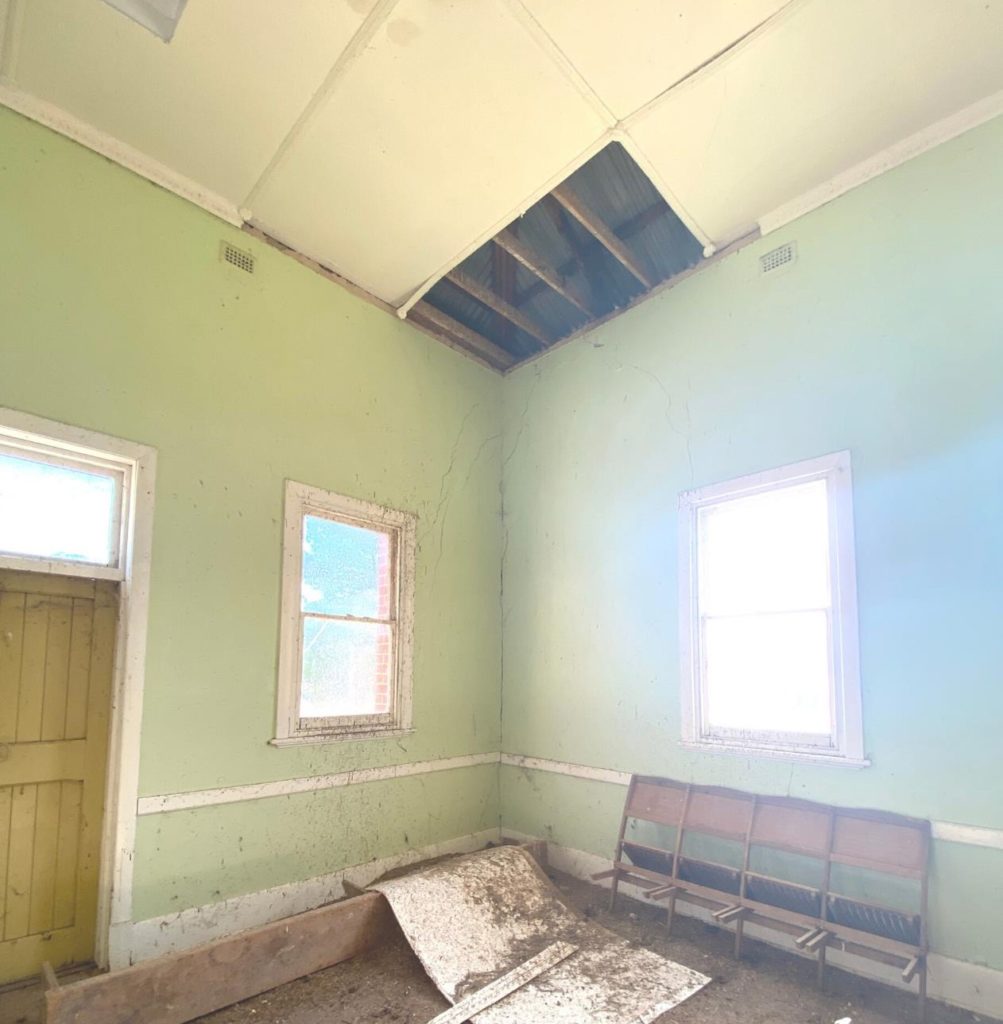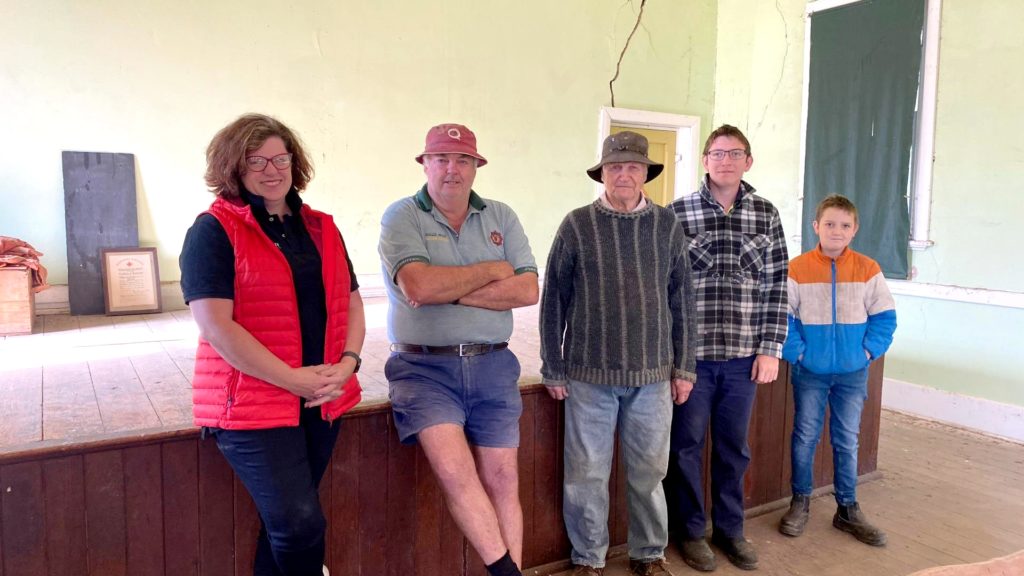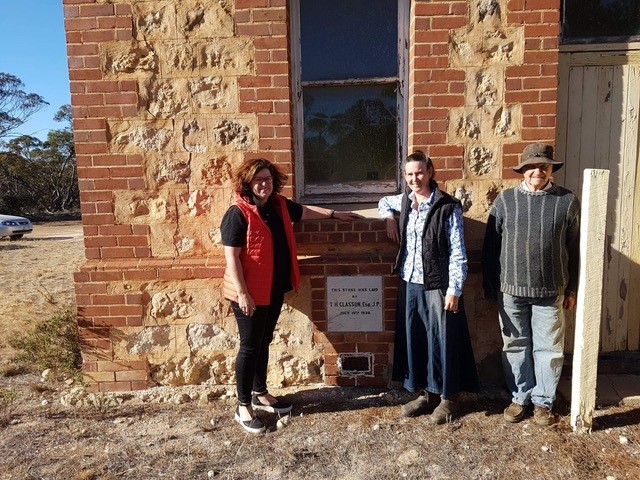Foundation for Rural & Regional Renewal (FRRR)
56 projects funded thanks to the Future Drought Fund
FRRR has awarded $3.65 million in grants to 11 agriculture-dependent regions across Australia, for projects that will better prepare their communities for the impacts of drought and a changing climate.
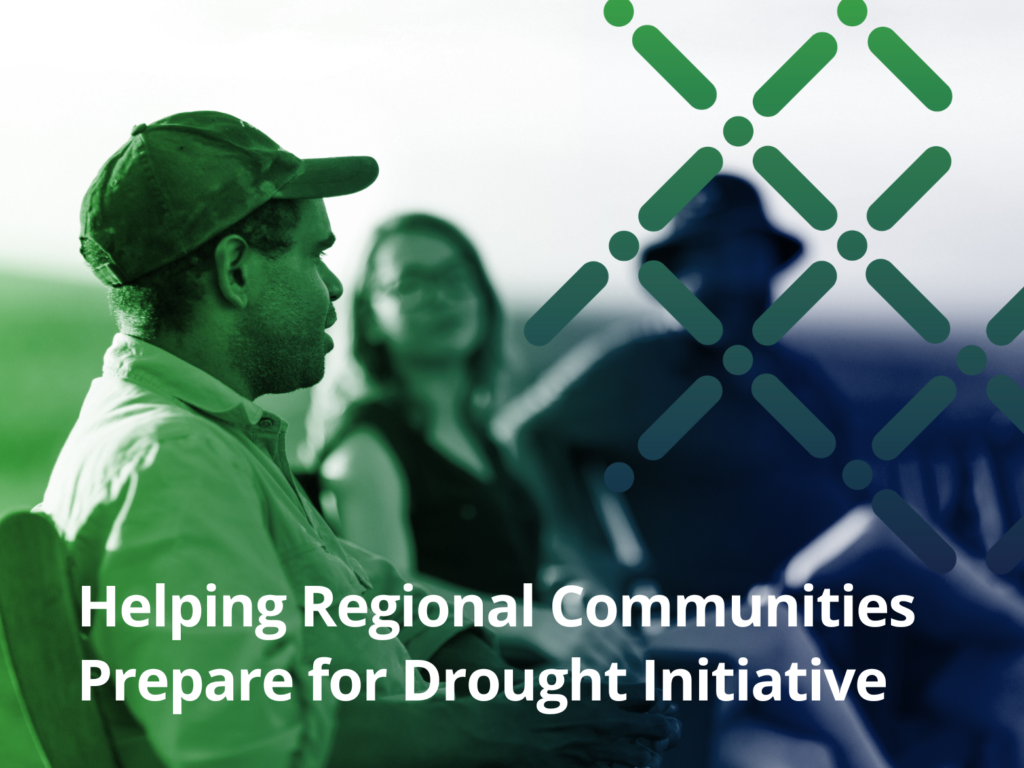
The $3,654,124 in grants is funded through the Australian Government’s Future Drought Fund, and delivered as part of the Helping Regional Communities Prepare for Drought Initiative’s Community Impact Program. To date, $9,115,583 in grants has been awarded to 27 agriculture-dependent regions, through the Program.
Delivered in partnership with ARLF, the Program aims to strengthen the ability of agriculture-dependent communities to work together to prepare for future drought or other disaster.
Nina O’Brien, Disaster Resilience and Recovery Lead for FRRR, said that the collaborative nature of the Community Impact Program means locals in each region have come together to identify and act on their communities’ drought preparedness priorities, at a grassroots level.
“The beauty of this program is that it’s so flexible. It can support events, initiatives, training and even small-scale infrastructure. But at their core, each project is about fostering the growth of stronger networks to encourage shared learning and more collaboration. We’re already seeing that happen among the program facilitators, who are leading by example, having established a community of practice, and mentoring one another across the regions.
“We recognise that co-design in each region has taken significant effort and we particularly thank the Community Partner Lead Organisations for stepping up and taking the lead in bringing everyone together. It’s been wonderful to be able to harness local knowledge and expertise and to have a cross-section of the community collaborate and create solutions. We know that these projects will strengthen the networks, support, engagement and wellbeing of people across their region.
“We look forward to seeing the continued growth of these networks and to seeing the impacts of these projects as they roll out over the next two years,” Ms O’Brien said.
Funded projects include a youth community hub and film festival on Mitakoodi Country, Cloncurry in Queensland. The Mitakoodi Community and Housing Aboriginal Corporation will use a $76,809 grant to develop the hub and festival, which will build a depth of social connection, a shared sense of purpose, and longer-term community belonging that locals can draw upon in future drought.
In Boyup Brook, Western Australia, Blackwood Basin Group Incorporated has been awarded a $40,730 grant to run a series of land management workshops, as well as produce written resources and provide accidental counselling. These capacity building activities will provide local people and communities with opportunities to develop the skills and knowledge to face the unique challenges caused by drought.
As part of the program, each region will also access tailored leadership development activities, delivered by ARLF.
ARLF Chief Executive, Matt Linnegar, says the leadership development supports the delivery of local projects and yields long-term benefits for the regions.
“We know that a multimodal approach of leadership development increases the impact the investments have in each region. In addition to the project funding, these leadership development activities build social capital required to support the project and people in each region. We get to connect local networks, create a deeper sense of shared purpose and develop capability that helps people to take action and address challenges and make the most of opportunities.”
Participants also gain access to the wider alumni network of the ARLF. “It’s these connections that prove invaluable to people. When they’re stuck, there’s someone to ask for advice,” Mr Linnegar said.
Other elements of the Future Drought Fund’s Helping Regional Communities Prepare for Drought Initiative are also underway, including a Mentoring program and an online network connecting community members involved in projects in each of the regions, both led by ARLF.
FRRR has also launched a portal providing access to experts to support delivery of their projects, if local expertise isn’t available. A small grants funding round will also open before the end of the year to support projects in areas not covered by the Community Impact Program.
Learn more about the Helping Regional Communities Prepare for Drought Initiative at www.frrr.org.au/drought-preparedness.
The full list of grant recipients and their projects are below.
| Organisation | Project | Location | Grant | |||
|---|---|---|---|---|---|---|
| New South Wales: Region 05 Northern Tablelands | ||||||
| Glenrac Incorporated | Community Partner Lead Organisation (CPLO): Region 05 Strengthen drought preparedness and drive local action in the Northern Tablelands region through the coordination of Community Impact Program activities and evaluation administration. | Northern Tablelands NSW Region | $30,146 | |||
| Glenrac Incorporated | Growing Social Capital, Glen Innes Enhance awareness of and attitude toward drought preparedness and build local leadership, networks and social support through a diverse series of community events, activities and delivery partners. | Glen Innes | $70,508 | |||
| Gwymac Incorporated | Connecting our Community for Resilience in Tough Times Enhance awareness of and attitudes toward drought preparedness through building local leadership, networks and social support through a series of collaborative events. | Inverell | $51,290 | |||
| Southern New England Landcare Ltd | SNEL HELP – Preparing Communities for Drought Increase the reach and activities of community leaders, mentors, networks and organisations driving action on drought resilience through the delivery of a series of community activities and events that will share information on the local impacts of drought, drought preparation activities and strengthen local connections, networks and relationships. | Armidale, Inverell, Uralla and Walcha | $62,214 | |||
| Granite Borders Landcare Committee Incorporated | Drought Community Impact Program Enable communities to identify and adopt innovative and transformative ways to build drought resilience through a series of collaborative workshops targeting innovation in drought preparation information and knowledge sharing. | Tenterfield | $70,936 | |||
| Queensland: Region 07 South-West | ||||||
| Southern Queensland Natural Resources Management Ltd | Community Partner Lead Organisation (CPLO): Region 07 Strengthen drought preparedness and drive local action in the South-West region through the coordination of Community Impact Program activities and evaluation administration. | South-West QLD Region | $20,500 | |||
| Thallon Progress Association Inc | PODDS 4 Thallon & Bollon (Place of Diversity & Development) Increase the reach and activities of community leaders, mentors, networks and organisations driving action on drought resilience through the development of shared workspaces in Thallon and Bollon. | Thallon and Bollon, Balonne Shire | $126,800 | |||
| Wyandra and District Progress and Recreation Association Inc | Wyandra & Surrounds Drought Resilience Leadership Network – Empower Paroo & Murweh Increase the reach and activities of community leaders, mentors, networks and organisations driving action on drought resilience across Paroo and Murweh through the delivery of community events, minor community infrastructure upgrades, leadership network establishment and connection to local support services. | Wyandra, Cunnamulla, Charleville | $83,615 | |||
| Queensland: Region 10 North-West | ||||||
| Southern Gulf NRM Ltd | Community Partner Lead Organisation (CPLO): Region 10 Strengthen drought preparedness and drive local action in the North-West region through the coordination of Community Impact Program activities and evaluation administration. | Queensland North-West Region | $33,007 | |||
| Southern Gulf NRM Ltd | Proactively Improving Mental Health Preparedness in Northwest QLD Enable capacity building activities where local people and communities have opportunities to develop the skills and knowledge to face the unique challenges caused by drought through the delivery of mental health first aid training across the region. | Cloncurry, Julia Creek, Richmond, Hughenden, Normanton, Burketown, Mount Isa | $66,209 | |||
| Southern Gulf NRM Ltd | Community Group Development Facilitator for Northwest QLD Improve capability, coordination and collaboration between networks, other community organisations and sectors that can be drawn upon in future drought through delivery of governance, volunteer management, communications and project management training. | Mount Isa, Cloncurry, McKinlay, Richmond, Flinders, Burke, Carpentaria | $148,538 | |||
| Mitakoodi Community and Housing Aboriginal Corporation | The Cloncurry Community Hub and Film Festival Build a depth of social connection, a shared sense of purpose and longer-term community belonging that can be drawn upon in future drought through the development of a youth community hub and film festival. | Mitakoodi Country,Cloncurry | $76,809 | |||
| Western Australia: Region 21 South-West | ||||||
| South West Catchments Council | Community Partner Lead Organisation (CPLO): Region 21 Strengthen drought preparedness and drive local action in the South-West region through the coordination of Community Impact Program activities and evaluation administration. | WA South-West Region | $23,768 | |||
| Warren Catchments Council | Green Spaces Counter the Blues Enable capacity building activities where local people and communities have opportunities to develop the skills and knowledge to face the unique challenges caused by drought through a coordinated series of water efficient landscaping / gardening workshops. | Shire of Manjimup | $75,661 | |||
| Southern Forest Arts Inc | Rivers of Thirst Build depth of social connection, awareness of and constructive attitudes to drought preparedness at the community level through community development of seven public artworks across towns in the region. | Manjimup, Boyup Brook, Nannup, Bridgetown-Greenbushes | $49,908 | |||
| South West Catchments Council | Community Resilience Network Improve the capability, coordination and collaboration between networks, other community organisations and sectors that can be drawn upon in future drought through the establishment of a Community Resilience Network of local groups in Community Resource Centres. | Manjimup, Boyup Brook, Bridgetown-Greenbushes, Donnybrook-Balingup, Augusta- Margaret River, Harvey, Dardanup, Busselton | $86,935 | |||
| Blackwood Basin Group Incorporated | Boyup Brook Community Drought Preparedness Enable capacity building activities where local people and communities have opportunities to develop the skills and knowledge to face the unique challenges caused by drought, through a series of land management workshops, production of written resources and accidental counselling training. | Boyup Brook | $40,730 | |||
| Goomburrup Aboriginal Corporation | Ni! Boodja Waangkiny (Noongar Seasonal Calendar) Enable depth of social and cultural connection, awareness of and constructive attitudes to drought preparedness at the community level through the development of a place-based, locally developed Noongar seasonal calendar that captures the knowledge and resilience of the people and culture with storytelling. | Bunbury | $66,000 | |||
| South Australia: Region 24 Northern and Yorke | ||||||
| Regional Development Australia Barossa Gawler Light Adelaide Plains Incorporated | Community Partner Lead Organisation (CPLO): Region 24 Strengthen drought preparedness and drive local action in the Northern and Yorke region through the coordination of Community Impact Program activities and evaluation administration. | SA Northern and Yorke Region | $56,893 | |||
| Lochiel Progress Association | Diner en Rose Build depth of social connection, a shared sense of purpose, and longer-term community belonging that can be drawn upon in future drought through a community event celebrating the local landscape. | Lochiel– Pink Lake (Wakefield Regional Council) | $21,170 | |||
| Wirraminna Care | Scone / Coffee Times Bringing Neighbourhoods Together to Share Socially Build depth of social connection, a shared sense of purpose and longer-term community belonging that can be drawn upon in future drought by addressing social isolation within the community. | Williamstown, Eden Valley | $7,000 | |||
| WoTL Ltd | Managing Yourself and Your Business Through Drought and Other Disruption Enable capacity building activities where local people and communities have opportunities to develop the skills and knowledge to face the unique challenges caused by drought through leadership workshops specifically designed for women. | Riverton, Clare, Kadina | $67,000 | |||
| Two Wells Regional Action Team | Drought Resilient Greening for Community Wellbeing Enable a change in awareness of and attitudes to drought preparedness at the community level and enhance the public good by planting drought-tolerant trees at three entrances to the township of Two Wells. | Two Wells | $3,000 | |||
| Barossa Improved Grazing Group Incorporated | Building Local Human Capacity to Support Drought Preparedness Across the Barossa Generations and Community Enable capacity building activities where local people and communities have opportunities to develop the skills and knowledge to face the unique challenges caused by drought through supporting and training young farmers. | Barossa, Light, Mid Murray | $55,000 | |||
| Victoria: Region 27 Mallee | ||||||
| Mallee Sustainable Farming Inc | Community Partner Lead Organisation (CPLO): Region 27 Strengthen drought preparedness and drive local action in the Mallee region through the coordination of Community Impact Program activities and evaluation administration. | VIC Mallee Region | $76,818 | |||
| First People of the Millewa-Mallee Aboriginal Corporation | Community Impact Program – Mallee Region Build depth of social connection and increase skills, knowledge and understanding of the risks posed by drought and climate change through land management training and mentorship of young First Nations people. | Neds Corner Station, Mildura | $41,200 | |||
| Birchip Cropping Group Inc | Mallee BCG Young Farmer Network Enable capacity building activities where young farmers have opportunities to develop the skills and knowledge to face the unique challenges caused by drought in remote, rural, and regional Australia through the growth of a Young Farmers Network. | Quambatook, Birchip, Manangatang | $32,960 | |||
| Mallee Sustainable Farming Inc | The Mallee Matters Build awareness of and changed attitudes to drought preparedness at the community level through the production of short videos that showcase local resilience. | Northern Mallee areas | $65,920 | |||
| Food Next Door Cooperative | Food Next Door Co-op: Sustainable CALD Market Gardening Build the capacity of local people and communities to develop the skills and knowledge to face the unique challenges caused by drought in remote, rural and regional Australia through irrigation management training for CALD communities. | Mildura, Merbein, Nichols Point and Red Cliffs | $56,856 | |||
| Rural Business and Community Limited | Shared Shop Increase economic diversification in an agriculture-dependent community through the establishment of a cooperative ‘shared shop’ for micro businesses in Donald. | Donald | $32,960 | |||
| Rural Financial Counselling Service Victoria Wimmera South West Inc | Resilient Small Businesses Deliver capacity building activities where local people and communities have opportunities to develop the skills and knowledge to face the unique challenges caused by drought in remote, rural and regional Australia through the establishment of a small business resilience network targeted at new, young and Indigenous business owners. | Mildura | $41,200 | |||
| Millewa Advisory Group | Millewa SHIM Shed Build depth of social connection, a shared sense of purpose, and longer-term community belonging that can be drawn upon in future droughts through the establishment of a community gathering space in the Millewa district. | Millewa | $17,304 | |||
| Victoria: Region 29 Wimmera Southern Mallee | ||||||
| Wimmera Southern Mallee Development Limited | Community Partner Lead Organisation (CPLO): Region 29 Strengthen drought preparedness and drive local action in the Wimmera Southern Mallee region through the coordination of Community Impact Program activities and evaluation administration. | VIC Wimmera Southern Mallee Region | $44,228 | |||
| Wimmera Southern Mallee Development Limited | Community Connector Program Improve the capability, coordination and collaboration between networks, other community organisations and sectors through service mapping, gap analysis, resource development and network capability building and service promotion before the next drought hits. | Whole of WSM | $133,700 | |||
| Wimmera Southern Mallee Development Limited (Migrant Settlement Services) | Migrant Youth Support Build depth of social connection, shared cross cultural drought knowledge and longer-term community belonging that can be drawn upon in future drought through a drought resilience building program for young migrants. | Horsham, Nhill | $50,000 | |||
| Wimmera Catchment Authority | Ranch Billabong Build depth of social connection, a shared sense of purpose and longer-term community belonging through the revitalisation, and increased visitation of a culturally significant site by the local First Nations and wider community. | Barengi Gadjin Land Council | $40,000 | |||
| West Vic Business Incorporated | Community Placemaking Build depth of social connection, a shared sense of purpose and longer-term community belonging that can be drawn upon in future drought through capacity building activities where local people and communities have opportunities to develop the skills and knowledge to face the unique challenges caused by drought through the establishment of a Place-making network. | VIC Wimmera Southern Mallee Region | $46,393 | |||
| Victoria: Region 32 West Gippsland | ||||||
| Food & Fibre Gippsland Inc | Community Partner Lead Organisation (CPLO): Region 32 Strengthen drought preparedness and drive local action in the West Gippsland region through the coordination of Community Impact Program activities and evaluation administration. | VIC West Gippsland Region | $96,050 | |||
| Rural Financial Counselling Service Victoria - Gippsland Inc | Backbone Build awareness of and attitudes to drought preparedness at the community level by producing two drought resilience special editions of the Rural and Regional Backbone magazine. | Latrobe Valley, South Gippsland, Wellington, Bass Coast | $99,880 | |||
| Food & Fibre Gippsland Inc | Gated Framework – Community Build capability in community leaders, networks and organisations to undertake strategic drought resilience planning and future drought preparedness activities through the development of a templated drought preparedness framework. | Baw Baw, Latrobe Valley, South Gippsland, Wellington, Bass Coast | $109,978 | |||
| Gippsland Women's Health Inc | Gendered Violence Prevention – Active Bystander Training Develop skills, knowledge and capacity to face the unique challenges caused by drought through Active Bystander (Family Violence) training. | Baw Baw, Latrobe Valley, South Gippsland, Wellington, Bass Coast | $44,122 | |||
| Rural Financial Counselling Service Victoria - Gippsland Inc | ADAPT Increase the reach and activities of community leaders, mentors, networks and organisations driving action on drought resilience by subsidising the delivery of ADAPT wellness program including online training and ongoing mentoring supporting small to medium sized grassroots organisations to access informal wellness support mechanisms at a community level. | Baw Baw, Latrobe Valley, South Gippsland, Wellington, Bass Coast | $35,000 | |||
| Victoria: Region 33 Ovens Murray | ||||||
| AgBiz Assist Limited | Community Partner Lead Organisation (CPLO): Region 33 Strengthen drought preparedness and drive local action in the Ovens Murray region through the coordination of Community Impact Program activities and evaluation administration. | VIC Ovens Murray Region | $30,000 | |||
| Alpine Valleys Community Leadership Fund Ltd | Community Capacity Building Support capacity building activities where local people and communities have opportunities to develop the skills and knowledge to face the unique challenges caused by drought through a community leadership program. | Indigo Shire | $95,000 | |||
| Startup Shakeup Ltd | Digital Work Skills Build capacity of local people and communities to develop the skills and knowledge to face the unique challenges caused by drought through business digital skills training. | Indigo Shire and City of Wangaratta | $95,000 | |||
| AgBiz Assist Limited | Wellbeing and Social Connection Build capacity of local people and communities to develop the skills and knowledge to face the unique challenges caused by drought through mental health awareness and support activities and training. | Indigo Shire and City of Wangaratta | $170,328 | |||
| Tasmania: Region 34 North and North West | ||||||
| Rural Business Tasmania Inc | Community Partner Lead Organisation (CPLO): Region 34 Strengthen drought preparedness and drive local action in the North and North West region through the coordination of Community Impact Program activities and evaluation administration. | TAS North and North west Region | $47,000 | |||
| Southern Farming Systems Ltd | Empowering Rural Youth to Build Capacity in Tasmanian Rural Communities Build depth of social connection and increase skills, knowledge and understanding of the risks posed by drought and climate change through tailored drought related events for three distinctive climates in the region. | Scottsdale, Ulverstone, Campbell Town | $102,000 | |||
| Rural Business Tasmania Inc | Local Communities Volunteer Project Build depth of social connection, a shared sense of purpose and long-term community belonging that can be drawn upon in future drought by connecting volunteer-based community organisations with young people in the region. | Fingal, Deloraine, Scottsdale, Whitemark | $114,084 | |||
| Tasmanian Leaders | Drought Resilient Impact Preparedness (DRIP) Build capacity of local people and communities to develop the skills and knowledge to face the unique challenges caused by drought through a targeted leadership program. | TAS North and North West Region | $99,709 | |||
| RANT Arts | Close Up: Drought Preparedness Build awareness of and attitudes to drought preparedness at the community level through the creation of accessible educational videos. | Devonport, Burnie, Latrobe, Meander Valley | $31,059 | |||
| Tasmania: Region 35 South Region | ||||||
| University of Tasmania | Community Partner Lead Organisation (CPLO): Region 35 Strengthen drought preparedness and drive local action in the South region through the coordination of Community Impact Program activities and evaluation administration. | TAS South Region | $38,778 | |||
| Rural Business Tasmania Inc | Local Community Volunteer Project Build a depth of social connection, a shared sense of purpose and longer-term community belonging that can be drawn upon in future drought by connecting volunteer-based community organisations with young people in the region. | TAS South Region | $100,000 | |||
| Southern Regional Natural Resource Management Association | Igniting Community Build culturally informed drought preparedness and social connection through a shared sense of purpose, which can be drawn upon in future drought through a series of cultural burn workshops. | Southern Tasmania | $100,000 | |||
| Reconciliation Council of Tasmania Limited | Youth Mob Build depth of social connection, awareness of and attitudes to drought preparedness at the community level by developing land management skills of young First Nations people. | Clarence and Sorell Municipality | $82,960 | |||
| Tasmanian Small Business Council Inc | Tasmania Small Business Community Resilience Project Build the capacity of local people and small business to develop the skills and knowledge to face the unique challenges caused by drought through a series of business workshops and field trips. | Dunalley, Triabunna, Swansea | $90,000 | |||
In partnership with the Sally Foundation and the ABC, FRRR has awarded $33,350 in grants to eight youth-led community projects in remote, rural and regional Australia as part of the Trailblazers program. The young people have partnered with local community organisations to receive the grants.
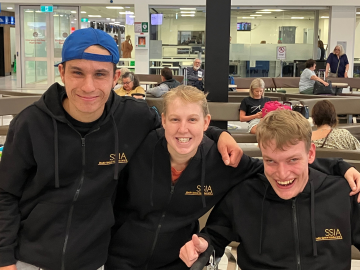
Through a Giving Sub-Fund, the Sally Foundation partners with FRRR to ensure that funding reaches groups and young people in all corners of the country. The priority of this fund is to invest in young regional leaders to build their leadership skills, and their capacity to make a difference in their communities. To achieve this, FRRR leverages our networks across rural and regional communities, draws on our expertise and systems to administer grant rounds, and provides skill development through workshops and direct one-on-one support around project development, grant writing, and understanding eligibility criteria.
Geraldine Roche of the Sally Foundation said, “The overall aim is to boost the skills of these emerging leaders to take on future funding opportunities with confidence and experience behind them.”
This year, Trailblazers attended the annual ABC Heywire Regional Youth Summit, where they received leadership and communications training and presented their projects on ABC radio and at Parliament House. Trailblazers from the 2022 and 2023 cohorts were then invited to apply for grants, funded through the Sally Foundation’s Trailblazers Development Fund, to help them bring their project ideas to life, or to help take their existing projects to the next level.
Joanna Kemp, FRRR’s Philanthropic Services Manager, said that young people are an integral part of of the process.
“There were three Trailblazer alumni on the Advisory Panel for this round of funding, and two of them had previously received grants through this fund, so their input is invaluable. They were able to draw on their Trailblazer experience and bring a youth-focused perspective to the process. Not only that, but they can speak from the perspective of being young people who live in regional areas.
“I’m always inspired by their curiosity and thoughtfulness about each application. They include constructive feedback for the applicants to help them continue building their grant writing skills for future funding opportunities. Equally, their experience on the panel is a great opportunity for them to learn about the grant process from a funding perspective, which broadens their view of the whole cycle,” Ms Kemp said
In this round, we saw some recurring themes. It’s clear that young people are eager to grow awareness around disability, environment and social inclusion. They are also wanting more access STEM activities that are delivered in a fun and engaging way. Two of the grantees this year were also successful in the 2022 round and their new projects continue to build on their activities, this time in a collaboration that will see them visiting schools in remote and rural Queensland towns and bringing their hands on programs to raise awareness and exposure to STEM learning and aviation pathways.
Receiving a grant through the program can help to build confidence for these young people to continue their leadership journey and be a springboard to further funding opportunities. You can see the full list of grant recipients below.
| Organisation | Project | Location | Grant | |||
|---|---|---|---|---|---|---|
| QUEENSLAND | ||||||
| Now I Can Run Inc | Racerunner's Take Over Aus Grow awareness and participation of people living with disabilities to participate in physical activity through a coaching course and training activities. | Various locations | $4,950 | |||
| RoboCoast Sunshine Coast Robotics Association | Red Dirt Robotics Increase access to STEM learning and activities for children in remote and regional Queensland through transport costs and repairs for touring education program. | Various locations | $4,237 | |||
| Royal Flying Doctor Service of Australia (Queensland Section) Limited | Trailblazer Tour - Aviatrix Australia x Red Dirt Robotics 3 month QLD Tour Improve awareness and exposure to STEM learning and aviation pathways for children in remote and regional Queensland communities through an outback educational tour of schools. | Various locations | $6,907 | |||
| TASMANIA | ||||||
| Now I Can Run Inc | Fighting Island State Tasmania (FIST) Improve social connections, reduce isolation and grow a connected community for people interested in Esports through the first Tasmanian Esports major competition. | Launceston | $2,000 | |||
| Self Help Workshop Inc | Project Vulcan - A Play by Disabled Artists about Climate Action and Disability Rights! Raise awareness about climate change, disability and inclusiveness through a touring theatre production across Tasmania and Victoria featuring actors with disabilities. | Launceston | $6,660 | |||
| VICTORIA | ||||||
| Gnarly Neighbours | Gnarly STEM Increase access to STEM based activities for youth in Seymour, Victoria, through purchase of IT equipment to expand activities at local youth centre. | Seymour | $5,096 | |||
| Lake Boga Waterski Club | Lake Boga Bank 2 Bank Improve social connections, health and wellbeing of young people and the wider community in the Swan Hill area through an annual community event at Lake Boga, Victoria. | Lake Boga | $2,000 | |||
| WESTERN AUSTRALIA | ||||||
| Forrest Personnel Ltd | Wings Without Barriers Raise awareness and acceptance of autism across remote, rural and regional communities through a solo light plane tour around Australia by Hayden McDonald visiting communities to share information about living and thriving with autism. | Various locations | $1,500 | |||
Wagait Beach is located on the Cox Peninsula just west of Darwin and is accessible by ferry (15 mins) or road (90 mins). Young people make up around 14% of the 461 residents and beyond seasonal sports, there are very few organised activities on offer locally. Parents and young people alike had been keen to increase access to drug and alcohol free activities which would build skills and support emotional, social and physical wellbeing and in 2021, Wagait Shire Council supported to the creation of the Wagait Youth Group.
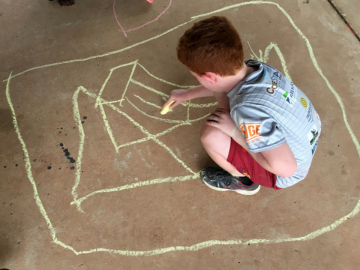
The Council received a Strengthening Rural Communities grant of $6,000 to assist with establishing their youth program that focused on building more opportunities in the community for young people including the co-design of a local Skate Park. Across four skate workshops, the children designed, built, and decorated portable ramps that went into immediate use, while plans are now well underway for the permanent skate park. Beach cricket, movie nights and discos for the school aged children have since followed.
In addition to a more physically active lifestyle, the young people felt listened to and have become more engaged and active in civic affairs. A collaboration developed between Health Lifestyle Seniors participants and the young people which saw the seniors sharing their skills such as cooking and sewing, which in turn built intergenerational bonds of appreciation and understanding.
Furthermore, the Council employed a Year 12 student for 12 months in the role of Youth Development Officer. This role takes the lead on designing, delivering, and reporting on the ongoing youth program. The Council hopes to continue offering this position annually and expand it into an internship, covering other aspects of council work and community service to develop youth leadership skills locally.
Yarning and other culturally-informed models of health can support people in the community to explore factors that impinge on social-emotional wellbeing (SEWB) and co-create solutions for individual and family wellbeing, including young people.
(Murrup-Stewart et al, 2021)
The Northern River Community Healing Hub is a network of local Indigenous and non-Indigenous volunteers who practice a range of culturally informed trauma-integrated healing modalities including weaving circles, art therapy and bodywork (massage). The hub was established following the catastrophic 2022 flood event in the Northern Rivers.
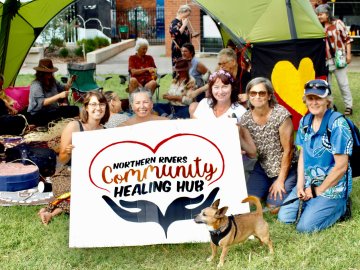
They received a grant for $24,570 through the Rebuilding Futures program, funded by the Suncorp Group to support the hub practitioners to grow and develop their work through increased service delivery moving from an entirely volunteer model to a hybrid paid / volunteer operation. NRCHH is available to all people, regardless of cultural background with a focus on their target population: Aboriginal and Torres Strait Islander people, children and young people, families, including older people. The project also included Mobile Hub operations to enable better access to the service within communities themselves – where they need them most, and in consultation with community.
The healing practice activity funded by the project has directly benefitted 639 people across the community at outreach to the pod villages of Coraki and Lismore, and tents at the Nimbin Aquarius Festival and Murwillumbah Kinship Festival, and workshops for a Queer Flood Recovery Event and an event for school children. In addition there have been weekly sessions at the Healing Hub including: 15 bodywork sessions per week free to the community; free flowing drop in weaving / yarning circle on Wednesdays; and clay art therapy once a week.
The NRCHH has evolved through the project. The paid / volunteer mixed model has been successful and they are now seeking input and collaboration that will deepen partnerships and relationships with the organisations that they currently work with to continue.
Project Manager Ruth Rosenhek said, “At the Healing Hub, we provide a de-clinicalised, informal soft-texture gentle space to support healing for our community that focuses on the whole person including a phenomenally successful bodywork program that runs alongside cultural activities such as weaving and yarning circles, creative arts and community connection. We have found that 18 months past the 2022 flood events, people continue to be managing high levels of stress and trauma. These cultural activities that involve sitting on country, slowing down the pace, connection and belonging are all powerful healing agents.”
At the 2020 ABC Heywire Regional Youth Summit in Canberra, 37 young regional Australians developed six exciting ideas to create a better future for young people across Australia. One of those ideas was We Need Farmers – educating and taking younger generations behind the scenes of farming. Timothy, Ebony and Taylor were the Heywire team behind the We Need Farmers project concept. They hoped that the project would increase the level of awareness and understanding that everyone has of Australia’s farmers. And especially, the hard work, time and effort that’s required to produce the produce for our nation.
“Our family farm is a third generation working farm. I love being there. The welcoming smell of the fresh air and the vast open landscapes. However, when my dad was a kid… they had 52 horses. Now there are 2. And over the last 25 years… our sheep numbers have fallen by 70%. We Need Farmers would help educate students on the hard work, time and effort that is required to stock those supermarket shelves and keep you full.”
Ebony, 2020 Heywirer, Western Australia
Gulf Youth in Ag was one of three groups that responded to the We Need Farmers project concept, receiving a grant for $9,979 to deliver a series of Paddock to Plate microdocumentaries.
Gulf Youth in Ag is an initiative of the Northern Gulf Resource Management Group (now Gulf Savannah NRM) that supports youth in the Gulf who are looking towards careers in sustainable agriculture. They support youth to engage with the agriculture industry with projects and networks to support young people.
The grant, which was funded by Friends of FRRR, enabled 12 members of the Gulf Youth in Ag group to complete a three-day intensive Film Making 101 course with a local production company. Students learnt film and sound production, developed storyboards, and the basics of editing.
Participants then formed three groups and chose a local farm to develop a film about the paddock to plate journey of the farm’s produce, to illustrate why we need farmers. They spent two days capturing farm footage and stories and interviewing the farmers.
The Paddock to Plate videos were launched to an audience of more than 70 local farmers, education providers, dignitaries and alumni of the Gulf Youth in Ag group. The finished videos were then distributed to 22 schools in the region and have been shared with the public through the Gulf Youth in Ag’s social media. The videos continue to be utilised in regional schools for use in the technology and science streams of the curriculum. The videos provide a resource for teachers to make the curriculum lessons relatable to the region.
Click on the image below to watch a short snippet explaining the project and showcasing the three videos.
Funding helps local preparedness projects get off the ground
Local groups in Korumburra, Myrtleford and Whittlesea township and surrounds, are taking an active approach to preparing their regions for future disaster, thanks to a partnership with FRRR’s Disaster Resilient: Future Ready (DR:FR) Victorian program.
As part of the place-based DR:FR program, the three regional communities are sharing a total of $120,839 in grants. These funds are already being put to use, with communities leading local initiatives designed to improve wellbeing, increase preparedness and strengthen resilience so that each place has greater capacity to endure, adapt and evolve positively when faced with the impacts of climate, disasters and other disruptions.
Nina O’Brien, FRRR’s Disaster Resilience and Recovery Lead, said that FRRR is the DR:FR initiative is an active partnership between FRRR and the communities.
The premise of the DR:FR program is to partner with local groups and community members, and provide them with the tools and resources to identify what their community needs to prepare for the impacts of climate change, natural disasters and broader disruptions.
“The priority projects have been under development since March, so it’s a major milestone to see the local groups getting these important ideas off the ground. We are inspired by the passion and persistence shown by each group and their eagerness to make a difference when the next emergency arrives. “We look forward to continuing to partner with these communities to better prepare their regions to withstand the impacts of future disasters,” Ms O’Brien said.
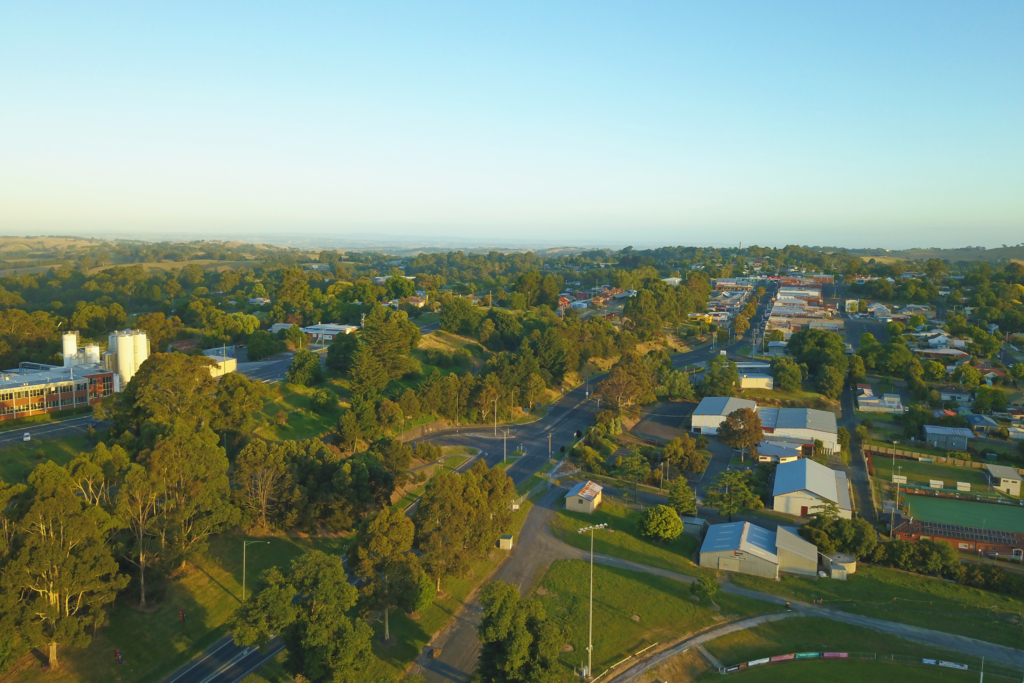 Korumburra, VIC (Image: Tamara Bauer)
Korumburra, VIC (Image: Tamara Bauer)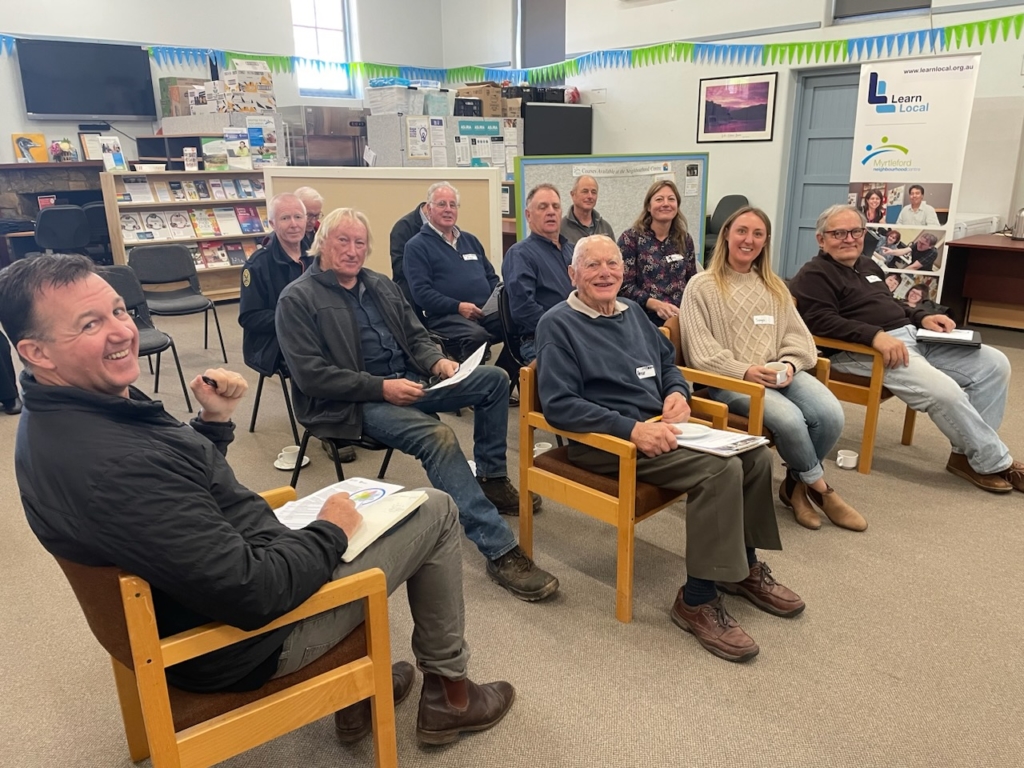 Myrtleford, VIC
Myrtleford, VIC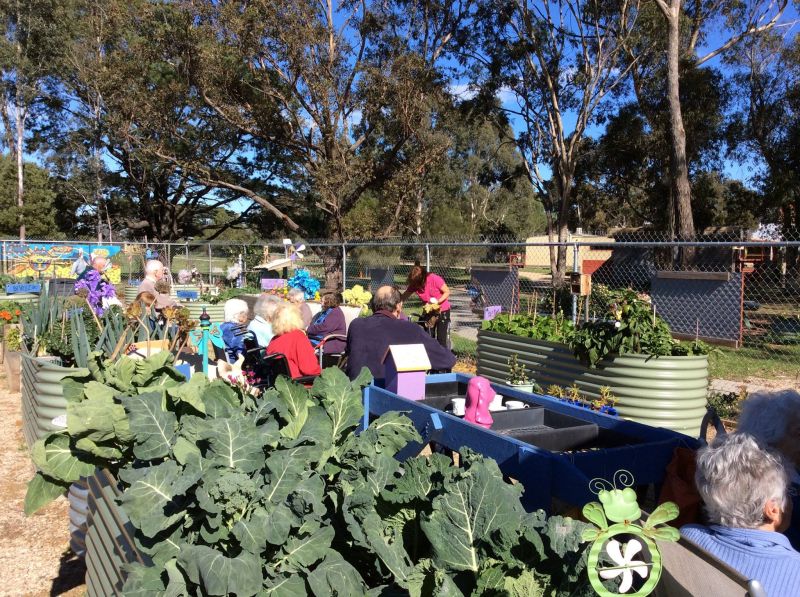 Whittlesea Township & Surrounds, VIC
Whittlesea Township & Surrounds, VIC
Community updates
Korumburra
Korumburra is setting up a Helping Hub, to be run from the local Community House.
The Helping Hub will match community volunteers with those in need of assistance via a website, social media and six-monthly volunteer expos.
The Hub will build community networks and provide connection to residents who need support, improving resilience generally and in emergencies such as storms or heatwaves.
Myrtleford
Mytrleford is fortunate to have a range of community groups and resources that can be mobilised to support the community during a disaster.
FRRR funding has been used to engage a person in a Community Connector Role for the Myrtleford neighbourhood to understand each group’s facilities and resources.
They will continue to work with the groups to plan how they can collectively support residents in the first 72 hours of an emergency event such as flooding or bushfire, and develop a Contacts Directory and Community Assets Map to make communication and co-ordination of resources easier in an emergency.
Whittlesea Township and Surrounds
Whittlesea Township and Surrounds’ Community Resilience Committee (CRC) is using their grant to employ a project officer to support a range of initiatives.
The CRC is keen to ensure that grassroots community action in future events is recognised in the formal Municipal Emergency Management Plan (MEMP) and, therefore, by the formal disaster response agencies. They have received support from the MEMP Committee and are currently rewriting a previous Community Emergency Management Plan, to be endorsed later in 2023.
A key project for this group is to set up a Community Emergency Response Network (CERN) of local residents and community organisations. For future large fires and storms, the CERN would be recognised as part of the formal emergency response and would coordinate the local community-level relief efforts.
The DR:FR initiative is collaboratively supported by many generous donors, who are acknowledged on the FRRR website.
For more information about this program, visit https://frrr.org.au/drfr-victoria/.
“The NRCF Board and staff certainly value the long-term relationship with FRRR, which is so important to us as a rural and regional Foundation. The support for NRCF’s community impact and grants team has been essential to achieve impact in the community.” Sam Henderson, CEO, NRCF
Northern Rivers Community Foundation (NRCF) was established in 2004 to connect people who care with local causes that matter, to improve community wellbeing for the Northern Rivers region of NSW. They have one of the largest footprints of any community foundation in Australia, covering from Tweed to Grafton, from the ocean all the way up past Kyogle, Woodenbong and Casino. NRCF is dedicated to improving the lives of those less fortunate in their community, either from economic circumstances, mental illness, disability, learning difficulties or drug / alcohol addiction. More recently their focus has been to support their community to navigate their disaster recovery journey following bushfires and then widespread flooding events across the region in early 2022.
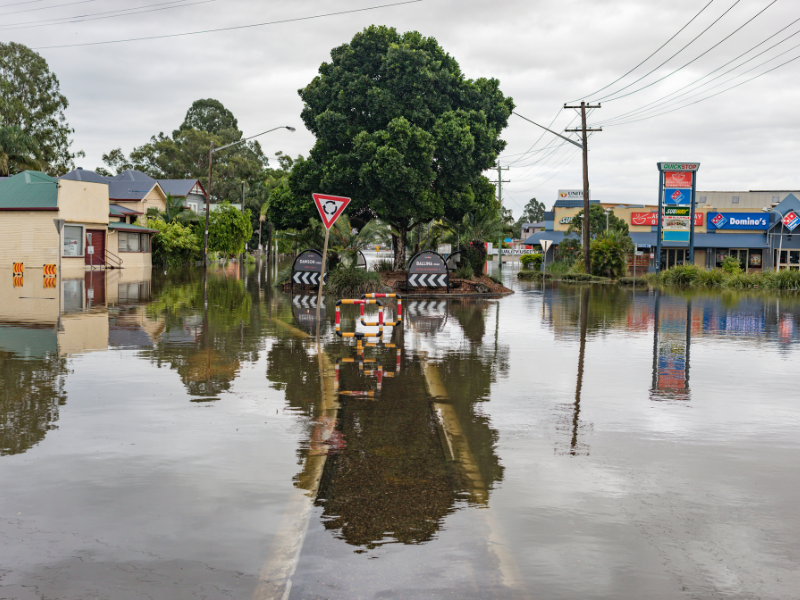
NRCF has held a Fundraising Account partnership with FRRR since 2017 to attract tax-deductible donations, enabling them to help community organisations meet increasing demands on their services and work together to build resilience across the community.
Initially they raised funds through a general Community Fund, and in 2020 established the Resilience & Regeneration Fund to raise funds specifically to support disaster recovery and preparedness in their region. The Fund responds to the increasingly frequent natural disasters affecting the region and the global pandemic. Recognising that these are not isolated events, and that resilience and regeneration are integral to a sustainable and prosperous region, they wanted to attract as much money as possible.
As at 30 June 2023, NRCF has raised $1,171,600 via these two Funds. In 2022, they announced a record distribution of $327,177 to 49 recipients across the seven LGA’s of the Northern Rivers. This was supported by distributions totalling more than $162,000 from their FRRR Fundraising Account in FY22. Projects span across disadvantage, housing and homelessness, recovery and resilience, and the environment.
NRCF will also be looking to use the funds raised through the Resilience & Regeneration Fund to respond in a meaningful and impactful way to the devastation brought about by the two 2022 flooding events that occurred in quick succession through their Annual Community Grants program. Informing their response is their ongoing research project to understand the issues and conditions impacting community recovery with a view to better support local not-for-profits and their activities into the future. In May 2023 they released their second flood impact report ‘Research, Respond, Recover: A year on from disaster’ which offers valuable insights across a range of indicators about how the community is recovering. It highlights gaps in funding for medium to longer term recovery, and ongoing key issues of concern around health and wellbeing, housing and homelessness.
With this increase in support comes a need for increased resourcing. Fortunately, NRCF has also received donations via their Fundraising Account specifically to support their operational and staffing costs through their General Fund. As a result, the role of Grants and Community Impact Manager has been introduced, which will boost their capacity, enabling them to expand their community grant programs and supporting them to broaden their reach.
Sam Henderson, NRCF’s CEO, said ‘The NRCF Board and staff certainly value the long-term relationship with FRRR, which is so important to them as a rural and regional Foundation. The support for NRCF’s community impact and grants team has been essential to achieve impact in the community.’ The need to respond to disasters has now increased so much that they’ve also recruited a part-time Grants Administration Officer to support the Community Impact Manager.
Environs Kimberley (EK) is the peak not-for-profit environmental organisation for the remote Kimberley region of Western Australia. Since 1996 EK has been dedicated to conserving and protecting the Kimberley’s natural, environmental, and cultural values. EK has supported and coordinated cultural-natural resource management (CNRM) projects in the region since 2007.
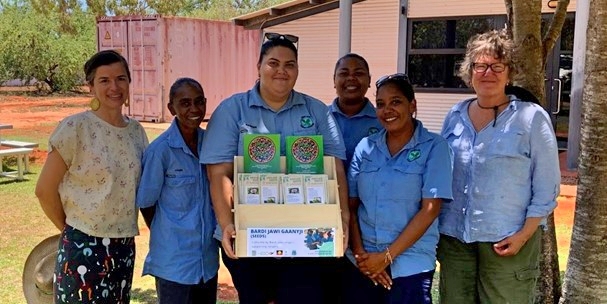
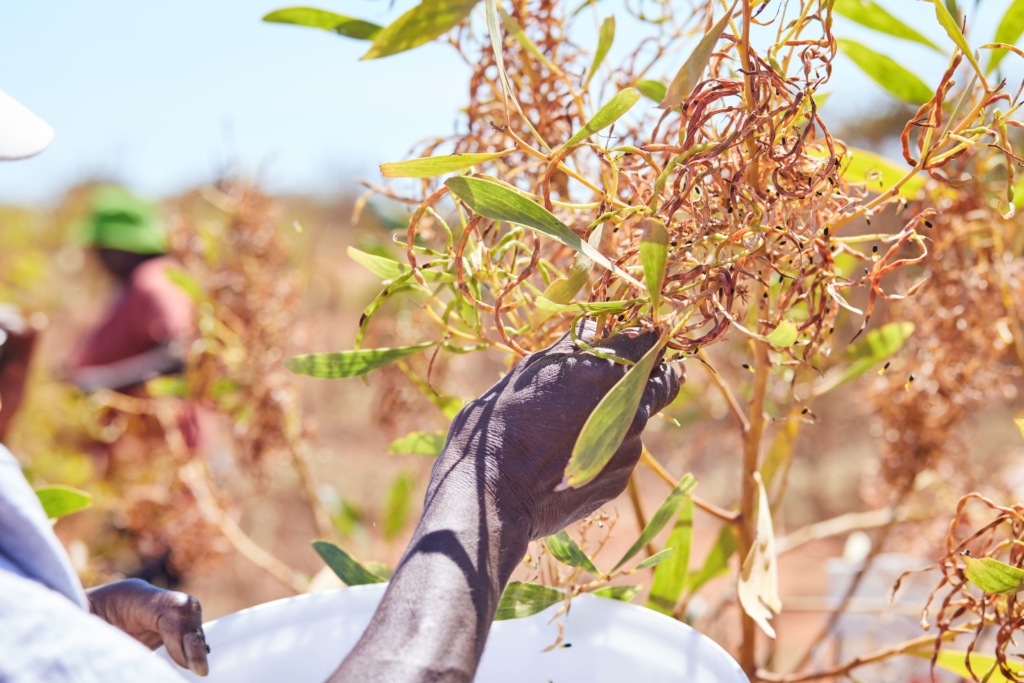
Nyangumarta seed collecting 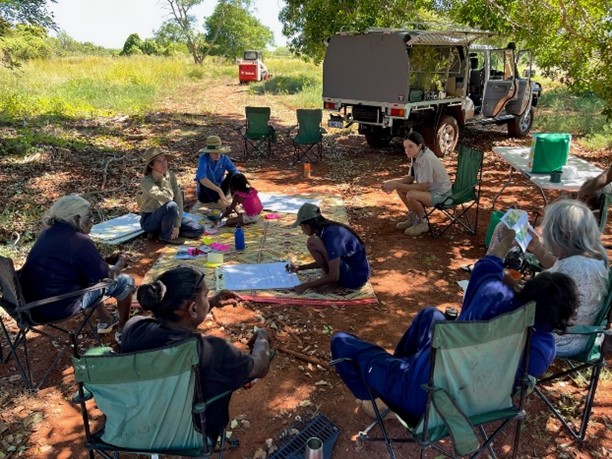
Karajarri Workshop, Purnturrpurnturr
EK collaborates respectfully and over the long term with Aboriginal rangers and their communities, First Nations groups, community groups, government, and scientists to apply traditional knowledge and the best scientific methods to CNRM projects including: invasive species and fire management; ecosystem restoration, threatened species, ecological survey, and monitoring; eco-cultural documentation and education.
EK’s Kimberley Community Seedbank (KCS) project was established in 2015 and EK has been working to develop the Seedbank into a sustainable social enterprise that furthers the conservation and protection of the Kimberley’s incredible natural and cultural values. In 2020, Environs Kimberley received a Strengthen Rural Communities (SRC) grant of $24,995, thanks to John T Reid Charitable Trusts, as funding towards Strengthening the Kimberley Community Seedbank: a sustainable social enterprise project.
A First Nations-led bush resource industry can support Aboriginal communities across the Kimberley to participate in economic development on their own terms and to undertake meaningful and sustainable work on Country. As a backdrop to this, the Australian bush resource industry has seen enormous growth over the past few decades, but despite this, a national survey by Bushfood Sensations (2019) found only 1% of the industry was led by First Nations people.
Hence, EK’s Sustainable Communities team has worked to build capacity for First Nations people to engage in and lead a Kimberley native plant resource industry. EK worked with four ranger groups to co-design business plans and complementary industry resources for two emerging social enterprises: Kimberley Seeds, and Wattleseed Collective where EK has supported Aboriginal collectors to develop skills in the exciting bush food and restoration industries to produce sustainable, socially responsible products.
The grant funded Environs Kimberley project management, co-design workshops, and the development of viable business models. EK delivered training to communities and ranger groups across the West Kimberley and established seed storage, roasting and cleaning infrastructure.
The Bardi Jawi Oorany Rangers, Karajarri Rangers, Nyangumarta Rangers, Yawuru Country Managers and Yiriman Women’s Bush Enterprise’s provided in-kind time and vehicle use for seed collection. EK provided in-kind time, seedbank and seed collecting equipment and coordinated volunteer activities. EK supported groups to develop their own business plans, financial models, packaging, marketing materials and a sales strategy.
EK coordinated the first pilot for commercial scale harvesting of wattleseed in 2022. The harvest saw the Wattleseed Collective gather and clean 40 kgs of (mostly) soap wattle (Acacia colei). This amazing effort resulted in sufficient product to enable Environs Kimberley to enter a product development phase and begin a process of securing access to markets for the coming year’s collections.
EK developed resources including a business plan template, a wattleseed harvesting guide, and wattleseed cleaning guide which are now available to share across the network of Kimberley-based Aboriginal-led businesses and individuals.
First Nations ranger programs are major employers in remote communities. By continuing to increase the capacity of the rangers in seed collection and social enterprise development, and working with other community members, Environs Kimberley is backing stronger communities to engage in the development of local, sustainable, conservation and cultural economies.
Applications are now open for the ANZ Seeds of Renewal program, with grants of up to $15,000 available for not-for-profit organisations in remote, rural and regional areas to support the ongoing prosperity of regional Australia.
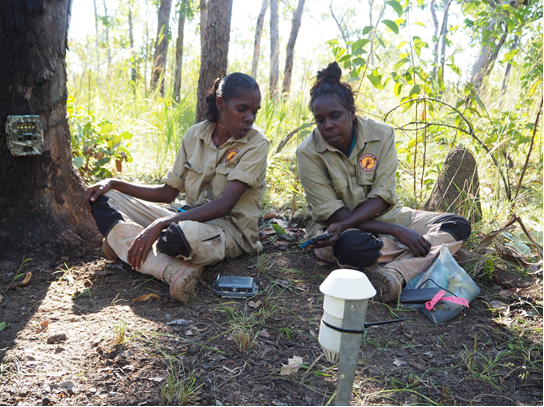
The program, which is now in its 21st year, is administered by FRRR, and has provided more than $5.5 million to more than 800 community groups for approximately 900 projects to help build vibrant and sustainable communities.
This year, the ANZ Seeds of Renewal program is again offering a share of $250,000 to community organisations in remote, rural or regional locations for projects aligned to four focus areas:
- Environmental sustainability: initiatives that restore and conserve the natural environment or which contribute to lower carbon emissions, water stewardship and waste minimisation;
- Financial wellbeing: particularly for under-represented and disadvantaged people in the community, including initiatives that improve economic participation. For example, building financial literacy and vocational skills and providing access to meaningful work;
- Housing access: initiatives and programs that support those experiencing or at risk of homelessness or that provide supports for people living with disability; or
- Projects that assist local communities to thrive: by either enabling vibrant communities where everyone can participate and build a better life, or creating sustainable communities that help deliver demonstrable medium to long term economic sustainability.
ANZ General Manager Business Banking Jenefer Stewart said: “ANZ is committed to enhancing the wellbeing and prosperity of the communities where our people live and work, and where our business operates. One way we do this is by reinvesting in communities through programs like Seeds of Renewal. This year we are proud to once again contribute to the long-term growth and sustainability of small rural communities,” Ms Stewart said.
FRRR CEO Natalie Egleton said: “In the current financial environment, we know there is a heightened need to support and strengthen the sustainability of rural Australia. We believe local leaders and community groups are best placed to identify and address the environmental, financial and housing concerns in their region, and to know first-hand what their communities need to thrive. Programs like ANZ Seeds of Renewal mean we can support these types of meaningful and community-led projects that promote the sustainability and liveability of remote, rural and regional Australia. We look forward to seeing what projects local groups put forward this year,” Ms Egleton said.
Last year, ANZ and FRRR provided grants to 20 community groups for projects including preserving Anbinik Rainforests through Indigenous Fire Management in Arnhem Land, NT; building capability and confidence by providing practical financial literacy skills and awareness training to women in East Gippsland, Victoria; providing fit out of accommodation to support women at risk of domestic violence and homelessness in remote WA; and delivering key skills training to increase the employability of young people in agriculture in Crookwell, NSW.
Applications open on 12 July and close 5pm AEST, 10 August 2023.
A grantseeker workshop will be held online from 1 – 2pm AEST, on Wednesday 19 July, 2023.
For more information about ANZ Seeds of Renewal, or to apply for a grant visit: https://frrr.org.au/funding/place/anz-seeds-of-renewal/.
It has been over 20 years since the rural town of Marama has had an active committee. In past generations of the committee, Marama Community Incorporated has been extremely social, connected and dedicated to keeping the town together. The main purpose of the committee was to bring people and community together with sport, dances, weddings, social events and church services. All of these events were usually held at the community-owned hall.
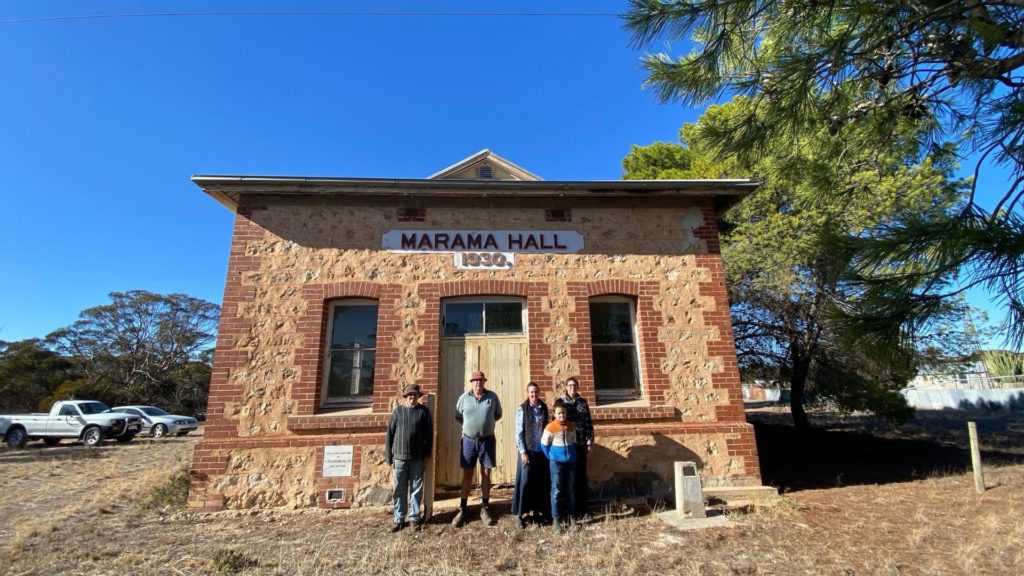
Now with a newly elected committee, the current generation was keen to foster a sense of belonging by renewing and improving the hall and providing a central place for activities to be held once again, however the space had fallen into disrepair after years of no use.
During the time the new committee was being elected, the district was also experiencing severe drought. A lot of the local farming community were feeling the effects on their mental health from prolonged drought. This added another layer of importance to the renewal of the hall; the community needed somewhere to come together and support one another.
With a $150,000 grant from the Australian Government’s Future Drought Fund’s Networks to Build Drought Resilience the committee was able to fund the underpinning, roof replacement, ceiling replacement, stone work, paint the interior, electrical work (including air-conditioning), and new toilet facilities.
The project relied on a big commitment from the community to get involved through volunteer work, local contractors and working bees to get the job done. But there was never any doubt they wouldn’t pull through!
Since completing the renovations on the hall the community has seen a dramatic shift in the attitudes of residents. Not only did the project give them a reason to meet throughout construction, but they now have a shared space to use that they can be proud of.
“Overall, the finished project is something we as a community are very proud of, and it has helped bring us together to work as a team to achieve a better, more user-friendly outcome.”
The hall has been host to a number of important community events since its completion and is booked in to host future events held by key industry groups that will benefit the community by improving abilities to adapt, reorganise or transform in response to a changing climate, increasing variability and scarcity of rainfall and changed seasonality of rainfall.

